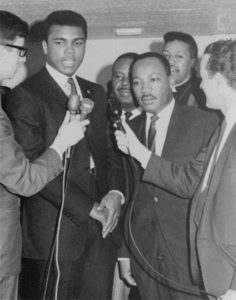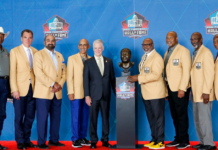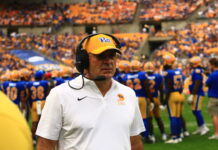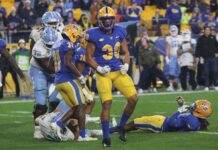
Muhammad Ali (1942-2016)
In the world of sports, there is its own world of great athletes. Such that not only are good at what they do, but are labeled great because they set the standard of their level of play. In layman’s terms: They were the standard. Some won championships, but some didn’t-which didn’t mean they were great. There were athletes who were given the title great because of what they did: The NHL’s Wayne Gretzsky and MLB’s (and Pittsburgh Pirates) Roberto Clemente were called ‘The Great One’-a title that each aptly earned as they weren’t just great, but their greatness led teams to championships and they also were inducted into their respective sports Halls of Fame.
Gretzsky and Clemente also made a difference off the field by reaching out to communities and making a difference. Those gentlemen were great, but there was one athlete who did those thing and more-and not only had an incredible impact in his sport, but the entire world. He called himself ‘The Greatest’. He’s none other than Muhammad Ali, who passed away June 3rd 2016.
Here’s an example of his greatness:
Born Cassius Marcellus Clay Jr. January 17th, 1942 in Louisville Kentucky, Ali was an American Olympic and professional boxer, who was widely regarded as one of the most significant and celebrates sports figures of the 20th century, and definitely in the African-American community. But like other great black athletes, Ali was raised during a time in which he faced tremendous scrutiny because of the color of his skin. Racism and segregation was very blatant during Ali’s childhood, which affected him deeply.
Clay’s boxing career began at the age of 12 when his bicycle was stolen. He was encouraged by a cop to learn how to box if he was to get that thief. That officer turned out to be a boxing coach named Joe E. Martin. He was later trained by legendary boxing cutman Chuck Bodak and through those two gentleman, Ali began to hone his boxing skills which eventually landed him his first amateur boxing match in 1954 and as a result, greatness flowed out of him and the awards soon followed.
A young Cassius Clay won 6 Kentucky Golden Gloves titles, 2 national Golden Gloves titles and Amateur Athletic Union title and that led him to a larger stage at the 1960 Summer Olympics in Rome, in which he won the gold medal in the Light Heavyweight Division. Such accomplishments opened the door to professional boxing.
In 1960, Ali won his first professional boxing match and simply breezed through the competition and ended up with an impressive 19-0. He even beat one of his former trainers in Archie Moore in 1962.
Clay didn’t just physically beat his opponents, he verbally ‘hit’ them with insults, an early version of ‘trash talking.’ Of course, the goal by Clay was to get into his opponent’s head, which often worked. Clay called boxer Doug Jones an ‘ugly white man’ and Henry Cooper a ‘bum’ but he saved his best insults for his biggest match in his young career for Heavyweight Champion Sonny Liston, whom he was scheduled to fight in 1964.
Clay was listed as an underdog, especially after Liston beat Floyd Patterson for the belt. Clay called Liston a ‘Big ugly bear’ and said that after he beat him, he would donate him to the zoo, and then Clay shocked the world by beating Liston in a 7th Round TKO for the Heavyweight Championship title which was historic on so many levels, especially when he quoted these words “Eat your words! I am the greatest! I shook up the world. I’m the prettiest thing that ever lived.”
And so, the Greatest was born.
Clay wasn’t the youngest to win the Heavyweight title (which was Patterson, at age 21), but he was the youngest to win the title from the reigning Heavyweight Champion. He actually held that title until 1986 when a 20-year old Mike Tyson took the title from Trevor Berbick.
Clay then made some changes to his personal life by converting to Islam and changing his name to what the world knew him as: Muhammad Ali. He then went back to work by defending his title against the previous two Heavyweight Champions: A rematch with Liston and Patterson. Ali continued to defend his title in and out of the United States which included a match in the Houston Astrodome against Cleveland Williams in 1964.
He then started getting attention out of the ring when he refused to be inducted into the armed forces in 1966. It created such an outrage that boxing threw a TKO at him by stripping him of his Heavyweight Championship belt and denying him a boxing license in every state-including being refused a passport. But that’s when the world began to see Ali the activist throw his punches as he publicly opposed the Vietnam War was a true advocate for civil rights for African Americans.
Ali’s anti-establishment disposition gained the attention from African-American athletes such as the NBA’s Bill Russell, Lew Alcindor (who would eventually become Kareem Abdul-Jabarr), the NFL’s Jim Brown and activists Malcolm X and Al Sharpton.
Ali was banned from Boxing from 1967-1970 and the following year, after gaining much sympathy he was given boxing licenses in Atlanta and New York. He then fought his way to the Heavyweight Title match vs. Joe Frazier which was named the “Fight of the Century.” After calling Frazier ugly and dumb, Ali was actually the one to lose in a unanimous decision, which was his first professional loss. Ali then lost to Ken Norton and after beating him in a rematch, faced Frazier in a rematch in 1974 and beat him in a unanimous decision, but it wasn’t for the Heavyweight championship as Frazier lost the belt to George Foreman.
Ali then took on Foreman in 1974 in Zaire dubbed “The Rumble in the Jungle.” Although he was given no shot at beating Foreman, Ali simply said “If you think the world was surprised when Nixon resigned, wait ’till I whup Foreman’s behind.” Ali then KO’d Foreman in the 8th round and once again became Heavyweight Champion.
Ali then fought challenger Chuck Wepner, the inspiration behind the boxing movie ‘Rocky’ (Ali was the inspiration of Apollo Creed, Rocky’s opponent) in which Wepner actually knocked down Ali in the 5th round. In 1975, Ali fought Frazier a 3rd time in Manila. The match dubbed “The Thrilla in Manilla” saw Ali beat Fraizer by TKO. After beating Norton, a 3rd time, Ali briefly retired two times before beating Leon Spinks in 1978, winning the Heavyweight title a record 3rd time. He would eventually lose his title a final time to Larry Holmes in 1980 and lost in his final fight to Berbick in 1981. He retired with an all-time record of 56 wins (37 by KO) and only 5 losses. He is considered one of the greatest heavyweights of all time and was ranked #1 by Ring Magazine and was tied with Babe Ruth as most recognized athlete by the Associated Press.
Ali was also featured in a comic book-opposing Superman in a 1978 DC comic titled Superman vs. Muhammad Ali. A biopic titled Ali was released in 2001 with Ali played by actor Will Smith.
Although his boxing career ended, Ali’s celebrity status grew as he appeared on several TV shows and he was also honored a star on Hollywood’s Walk of Fame, although it’s not on the sidewalk, because he didn’t want his name to be stepped on. He was also inducted into the International Boxing Hall of Fame and was one of only 3 boxers to be named Sportsman of the Year by Sports Illustrated. In fact, he’s second to Michael Jordan in appearing on the most SI covers with 40 and was named Sportsman of the Century by the magazine.
Ali has also served as an ambassador, traveling to Iraq and met with Saddam Hussein in an attempt to negotiate the release of American hostages in 1991, in 2002, he traveled to Afghanistan as the UN Messenger of Peace in 1981, he talked a man out of committing suicide and supported President Ronald Regan in 1984. He also lit the torch that began the 1996 Summer Olympic Games in Atlanta. He was given the Congressional Medal of Freedom by President George W. Bush in 2005.
His hometown of Louisville showered Ali with honors including the $60 million non-profit Muhammad Ali Center opened in downtown Louisville in 2005. The Center focuses on peace, social responsibility, respect and personal growth. The cultural center was built as a tribute to Ali and his values. He was also honored with a mural in Los Angeles.
Ali’s daughter Lalila carried on his boxing legacy by becoming a successful boxer of her own, going 21-0 from 1999-2004. She is also a celebrity.
in 1984, Ali was diagnosed with Parkinson’s disease which slowly deteriorated his health in the ensuing years. But he kept up his good works and public appearance until early June of this year when his health worsened. He passed June 2 due to septic shock and was mourned by the world. His memorial service will be at the KFC yum! Center (home of the Louisville Cardinals).
Ali wasn’t just a champion in the ring, he was a champion at life, and no matter what tried to knock him down. The man kept coming and kept fighting. That’s why he was labeled The Greatest. Like the world has done, we honor this man.
“Float like a butterfly, sting like a bee.”
Please e-mail Ray at ray@urbanmediatoday.com
Follow him @urbanmediaRay on twitter
sources: Wikipedia/Muhammad Ali Center http://alicenter.org/



































